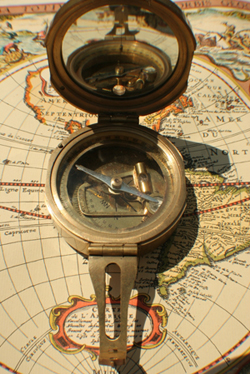Editorial
This issue's Pluschat topics
What motivates mathematics?

What will the mathematical explorers discover?
At Plus we appreciate the full spectrum of mathematical motivation. We celebrate everything from concrete applications of maths that affect our everyday lives to the explorations of the more esoteric realms of the subject, pursuing mathematical understanding, truth and beauty. Research in any field is and exploration into the unknown. The great explorers of the past, such as Christopher Columbus and Marco Polo, may have been funded by people hoping to profit from their adventures, but the explorers themselves were more interested into stepping into the unknown, seeing the unseen and learning new things about their world.
Theoretical physics is a classic example of mathematics that the human mind has been able to research well before technology could even hope to catch up. Mathematicians have been wrestling with the nature of our universe for hundreds of years but the theoretical understanding has outstripped the technological capability to test that theory... until now. An increasing number of researchers are finally able to test elements of Einstein's special theory of relativity, and more importantly look for where his theory breaks down.
Groups such as those at the University of Washington and Indiana University now have equipment sensitive enough to detect violations to Einstein's theory, and hope that this might lead them to one of the holy grails of modern physics — quantum gravity — a unification of special relativity and quantum mechanics (read more about the search for relativity violations). This might seem a bit unnecessary when Newton's equations of gravity are close enough for most of us here on Earth. But Einstein opened our eyes to the elegant yet enigmatic nature of our universe, and these researchers are continuing in Einstein's and Newton's footsteps. If we stopped trying to understand our surroundings when we felt we had a theory that was just close enough, then we wouldn't know about the nature of atoms, molecules or DNA, or even be reading Plus on our computers.
There are many examples of applications vital to our lives that started off as highly theoretical explorations. Group theory arose from the fields of geometry and number theory in the 18th and 19th centuries, and is now an important field in pure mathematics. But this theoretical area has turned out to have very real relevance in this century — group theory is vital for error detecting codes which enable transmission of data, validate your credit card number and even prevent your CD from skipping. (Read more in the Plus articles "Coding theory: the first 50 years" and "Take a break" and at the St Andrews History of Mathematics site).
Now government and industry are beginning to realise that they can profit from these mathematical explorers, and it can provide real value to their businesses. A government industry consortium — the Mathematics Knowledge Transfer Network — has just been launched in the UK to more aggressively promote mathematics to industry. The network aims to help companies realise the commercial potential of mathematics and its strategic role in innovation. The fact that big names in industrial research such as Unilever and Hewlett Packard are already on board indicates that the business community is ready for its maths lesson.
Vibrant mathematical research is being done on areas with direct applications to science, technology and business. And equally vibrant and important research occurs in theoretical areas whose applications are as yet unknown. Whether these explorers find something of value to those of us back here on the mainland is not the important thing. That they are there, stepping into the unknown, discovering new knowledge and gaining greater understanding of the mathematical world is reason enough.
Win glory and more as a Plus author!
We are very pleased to announce that this May Plus will be launching our very first science writing competition. School students, undergraduates and anyone from the general public are invited to write on any topic with a mathematical angle that is aimed at the Plus audience, with the closing date for entries in late September. The winners will not only have their articles published in the December issue of Plus they will also win a haul of prizes including an iPod!
So start honing your ideas and stay tuned for details of the competition. If you are subscribed to our newsletter you'll be sure to get all competition information first. Get writing — glory and booty await!
If you have anything to say about these or any other topics that might be of interest to Plus readers, e-mail plus@maths.cam.ac.uk. Let us know if you are happy for your email and our response to be published in Plus. (We may edit emails before publication.)